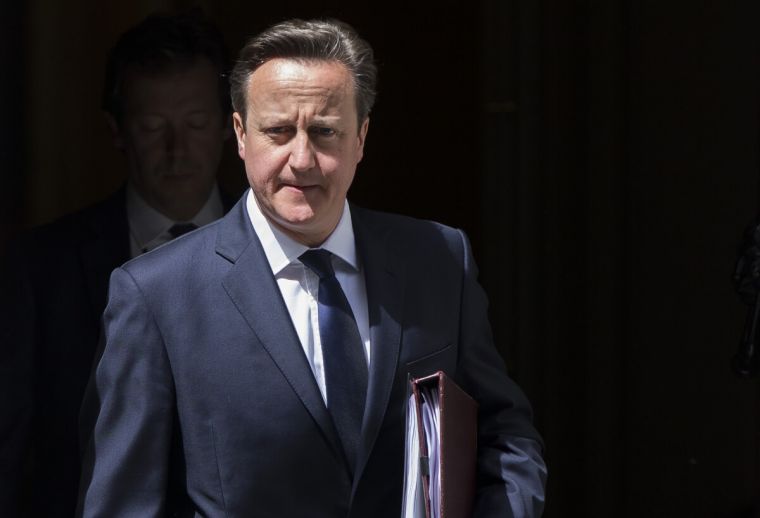Should we bomb ISIS in Syria? Christian responses to Cameron

As David Cameron today tried to persuade MPs of the need to begin a bombing campaign in Syria, British Christian groups varied significantly in their reactions, and their views on whether it is right to go to war.
Cameron told the Commons that "we face a fundamental threat to our security" and doing nothing "could make the UK more of a target for ISIL attacks".
There are wide variety of views within the Christian community:
FOR
The Church of England has been one of the voices thought to be supportive of military action, though this conviction seems to waver somewhat.
This week the Archbishop of Canterbury, Justin Welby, appeared to come out in favour of military action in Syria. His speech to the Synod on Tuesday was measured, and less forceful than in an earlier copy of his speech given to journalists. Though it is "not a war against Islam", he said "there will be aspects that may involve the use of armed force in a quasi-policing form. We will differ over when that is right and wrong."
The Church of England Synod then voted in favour of supporting military action only when intended to help refugees flee safely from the region. Welby then said that intervention "must use some kind of forceful response".
Canon Andrew White, the 'vicar of Baghdad' who was forced to leave Iraq due to the danger, had previously called for military action and ground troops to fight ISIS, before the Paris attacks took place. "The only answer is to radically destroy them... I will do anything to save life and bring about tranquillity, and here I am forced by death and destruction to say there should be war."
However, when challenged on the issue in a recent interview with the Spectator, White said: "War creates war and we have to find other ways round doing it."
The head of the Catholic Church in England and Wales, Cardinal Vincent Nichols, has said that the use of force may be defensible in intervention towards the Islamic State, if 'precise' and not 'indiscriminate'. "I don't think there's any doubt that effective action is called for to stop the actions and the activities of ISIS... Specific use of weapons in a defensive mode is defensible," he told Premier.
AGAINST
Jeremy Moodey, who runs Christian charity Embrace the Middle East, told Christian Today that he "remained to be convinced" about military intervention in Syria and criticised Cameron's statement to the Commons. "He makes much of the 'self-defence against terrorism' argument but his statement that 'the main threats against this country are planned and orchestrated' in Raqqa, Syria, is not backed up by any hard evidence."
He added: "The Prime Minister also makes no mention of the likely civilian casualties in any extension of air strikes, and how (as in Libya and Afghanistan) these may strengthen rather than weaken the hands of extremists. The simple fact is that there is as yet no coherent military or diplomatic strategy to end the violence in Syria, and until there is, it is far from clear what extending the British bombing campaign to Syria will achieve beyond creating yet more misery and suffering."
Bernadette Meaden, an associate of the left-leaning Ekklesia think tank, questions why money is found for war but yet spending cuts are needed within the social care system. "Why is the government so determined to protect British people from dying at the hands of terrorists, but completely unconcerned about British people dying as a result of its own policies?" she said on the Ekklesia blog.
"Politicians seem to relish projecting power abroad, in military actions where the results are entirely unpredictable, ostensibly to protect us. Yet through simple policy and spending decisions they have the power to safely and surely prevent deaths here at home, and do not use it."
However it is not just those on the left who are questioning the 'rush to war'. Peter Hitchens, the outspoken conservative Mail on Sunday columnist, who is a practising Anglican, has been urging the public to write to their MP and oppose any military action by Britain on his blog.
While many have come out decisively for or against military action, the Evangelical Alliance is not taking either position but hopes for a long-term plan. Advocacy officer Dave Landrum said: "Even if we decide to take military action, it will need to span decades. We can't go in and think we can establish a democracy and step out. The kind of intervention required here needs to be sustainable. Does the West have the will for that kind of sustainable commitment? Is the West thinking in the same time frames as ISIS is thinking – in terms of decades and centuries?
"In a globalised world, not being involved is not an option. We shouldn't think there is a McDonald's solution to this problem."
Landrum also highlighted the genocide being committed against Christians and other minorities by Isis, and the work done by Christian charities such as Christian Solidarity Worldwide, Open Doors and Release to support the victims.











